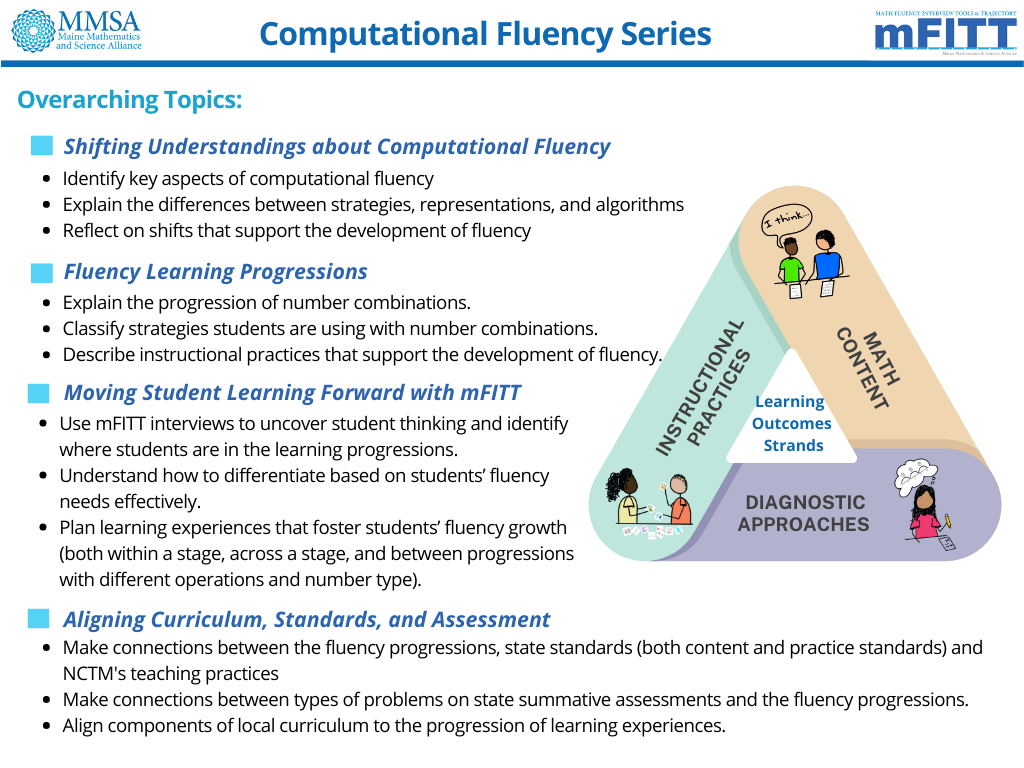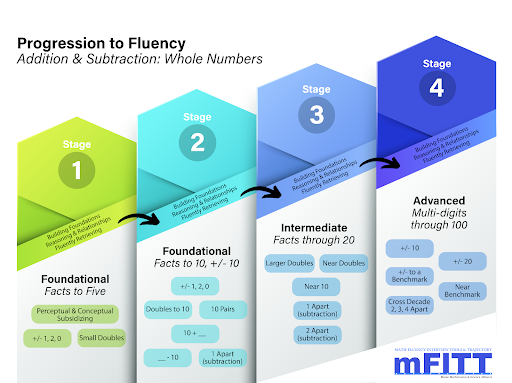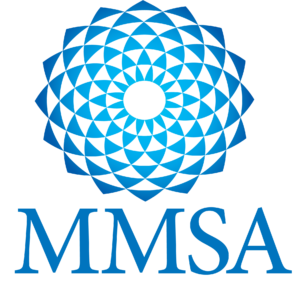MMSA offers professional learning in mathematics to support educators in identifying strategies and classroom practices to move student learning forward. The learning series offers four content pathway options. Each pathway includes four full days or eight half days of professional learning. Sessions are facilitated in-person, virtually, or in a hybrid format based on a school/district’s preferred mode of delivery. Explore the options below to find a pathway that best fits your needs.


*The core series includes progressions for addition, subtraction, multiplication and division of whole numbers, fractions, and integers.
Sample Outline (8, 3-hour modules)
Learning Outcomes: As a result of the learning experiences in the workshop series, you will:
- Math Content: Build a deep and flexible understanding of procedural fluency strategies, progressions, and connections with the Standards for Mathematical Practice from the Common Core State Standards
- Diagnostic Approaches: Build knowledge of how to identify student advancement in the progression of procedural fluency and the phase of fluency they are working within.
- Instructional Strategies: Expand repertoire of research-based instructional practices for teaching procedural fluency to all students and supporting their growth towards fluency.
Module Foci
Module 1: Shifting beliefs about mathematical fluency
- I can identify key aspects of mathematical fluency
- I can reflect on shifts that support the development of fluency
- I can explain the differences between strategies, representations, and algorithms
Module 2: Fluency Learning Progressions
- I can reflect on shifts that support the development of fluency.
- I can explain how fluency learning progresses.
- I can classify strategies students are at using (beginning and intermediate stages).
Module 3: Uncovering student thinking
- I can use interviews to uncover student thinking.
- I can identify where students are in the learning progressions.
Module 4: Connecting Fluency to the Mathematical Practices
- I can explain how the shifts in fluency support the Standards for Mathematical Practice.
- I can utilize the Mathematical Teaching Practices to effectively teach mathematical fluency.
Module 5: Extending fluency to more advanced stages
- I can classify strategies students are at using (intermdiate and advanced stages).
- I understand how fluency supports CCSS and MLR standards.
Module 6: Accelerating student learning
- I understand the difference between remediation and acceleration.
- I can utilize math games and routines to accelerate students’ fluency growth.
Module 7: Engaging with caregivers and stakeholders
- I can effectively engage with caregivers and stakeholders to create a common understanding of the shifts in fluency.
Module 8: Lasting change for fluency: Aligning curriculum with fluency beliefs (note- ideas from this Module are embedded in Mods 1-7, this culminating session provides space for educators to plan next steps)
- I can connect the shifts in fluency to my curriculum.
- I can enhance the aspects of my curriculum that support all aspects of fluency for my students.
As part of the learning series, we offer supplemental coaching support focused on student-centered learning goals and the use of formative assessment to inform instructional planning. We work closely with educators and districts to identify, gather, and analyze student and teacher outcome data to document learning and growth. Coaching can take place in-person or virtually at any grade level and we can flexibly schedule coaching sessions in teams or individual cycles.


